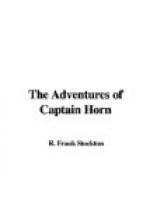Captain Horn had been in considerable doubt in regard to the best method of shipping the treasure; should he be so fortunate as to find it as he had left it. The cove was a quiet harbor in which the small boats could easily ply between the vessel and the shore, but, in this case, the gold must be carried by tedious journeys along the beach. On the other hand, if the brig lay too near the entrance to the caves, the treasure-laden boats must be launched through the surf, and, in case of high seas, this operation might be hazardous; consequently, he determined to anchor in the Rackbirds’ cove and submit to the delay and inconvenience of the land transportation of the gold.
When the captain and Shirley went ashore in a boat, nothing was seen to indicate that any one had visited the spot since the last cargo of guano had been shipped. This was a relief, but when the captain had wandered through the place, and even examined the storehouse of the Rackbirds, he found, to his regret, that it was too late for him to visit the caves that day. This was the occasion of a night of wakefulness and unreasonable anxiety—unreasonable, as the captain assured himself over and over again, but still impossible to dissipate. No man who has spent weeks in pursuit of a royal treasure, in a vessel that at times seemed hardly to creep, could fail to be anxious and excited when he is compelled to pause within a few miles of that treasure.
But early in the morning the captain started for the caves. He took with him Shirley and Maka, leaving the brig in charge of Burke. The captain placed great confidence in Shirley, who was a quiet, steady man. In fact, he trusted every one on the ship, for there was nothing else to do. If any of them should prove false to him, he hoped to be able to defend himself against them, and it would be more than foolish to trouble his mind with apprehensions until there should be some reason for them. But there was a danger to be considered, quite different from the criminal cupidity which might be provoked by companionship with the heap of gold, and this was the spirit of angry disappointment which might be looked for should no heap of gold be found. At the moment of such possible disappointment, the captain wanted to have with him a man not given to suspicions and resentments.
In fact, the captain thought, as the little party strode along the beach, that if he should find the mound empty,—and he could not drive from his mind that once he had found it uncovered,—he wished to have with him some one who would back him up a little in case he should lower his lantern into a goldless void.
As they walked up the plateau in the path worn principally by his own feet, and the captain beheld the great stone face against the wall of rock, his mind became quieter. He slackened his pace, and even began to concoct some suitable remarks to make to Shirley in case of evil fortune.




